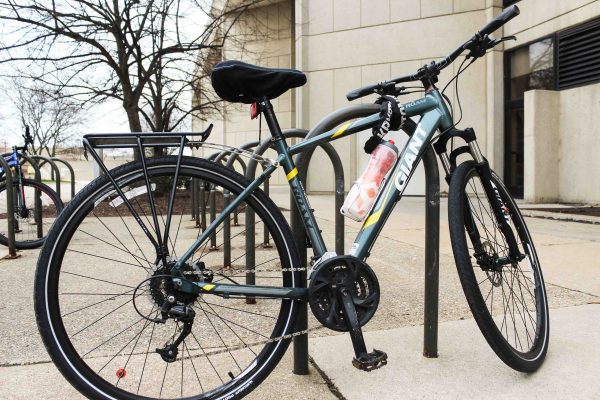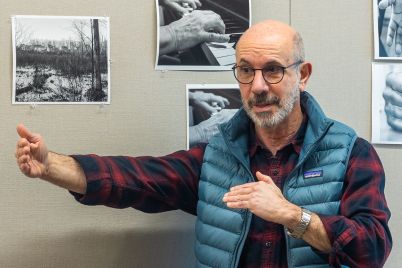
Biking, walking and public transportation are some eco-friendly alternatives to driving a car to school and work. Lilly Kujawski | Washtenaw Voice
By Adeline Griffith
Contributor
Washtenaw Community College is working hard to be more sustainable and encourage students to do the same.
The WCC Sustainability Council, run by the college President, strives to integrate more sustainability into the way the college is run. They oversee facilities such as the recycling operations department, which installed indoor and outdoor recycling stations all throughout campus, and the ground maintenance department, which works to take care of the native trees and plants at WCC.
“Trees save energy, filter water and air, and cool temperatures,” said Donna Reincke, a member of the WCC grounds crew. “If you live in an area with lots of trees, you’ll notice temperatures don’t get quite as high.”
Reincke passed out small trees to students at the WCC Earth Day event on April 11. She hoped that by spreading awareness of the good that trees do, students would feel inspired to plant these trees, thus helping the climate.
Climate change is a worldwide issue that is affecting all of us. There is a lot that can be done to help, whether that is getting actively involved in local organizations, or simply tweaking your habits slightly.
“It’s not only your actions that make a difference, but getting involved and spreading the word,” said Dale Petty from the WCC Sustainability Council.
The WCC Sustainability Council provides many volunteer opportunities for students. To get involved you can visit their webpage and send them an email that specifies what areas of sustainable living you’re most interested in.
There are also many off-campus organizations that can always benefit from volunteers, including the Sierra Club, Huron River Watershed Council, Ecology Center, Growing Hope and the Leslie Science Center.
However, volunteering is not the only way to help. There are many ways that students can integrate sustainability into their everyday lives. One example is buying local food, as well as food with less packaging.
“When you buy local, you don’t have to worry about how far your food goes,” said Jazmin Bolan from the Ypsilanti Food Co-op. “The less the food travels, the less packaging and emissions get used. For example, if you buy food that came from California, that’s a long way to drive. Think about all the emissions from the truck.”
As summer nears and local farmers markets open, access to local food will increase. However, there are places like the Ypsilanti Food Co-op and Argus Farm Stop that stay open year-round and continue to provide a variety of locally grown food.
Students can also purchase reusable items such as grocery bags, to-go mugs and water bottles to cut down on their own personal waste. The average American throws away about 185 pounds of plastic per year, according to EcoWatch.com. Students can decrease this amount by replacing one-time-use items with reusables.
Purchasing reusable items not only helps the environment but can also help save money. Investing in a non-disposable water bottle means you no longer have to pay for a bottle of water every time you’re thirsty. Instead, you can simply fill up the water bottle you brought with you for free at a nearby drinking fountain. Additionally, many coffee shops, including the Java Spot on campus and Espresso Royale offer small discounts for bringing in your own mug. Some grocery stores, such as Arbor Farms Market, even offer small amounts of compensation for bringing in your own grocery bags.
Reducing the amount of meat in your diet is another great way to help the environment and live more sustainably. The livestock industry produces about 6 billion tons of greenhouse gas per year, according to an article by Mario Herrero at TheConversation.com. The Mayo Clinic suggests cutting out meat one to two days a week as a good starting point, since it may be difficult to make a sudden switch to vegetarianism.
“Even just eating less meat helps,” said Petty. “Instead of eating a big steak, pick something else.”
Students may also want to consider walking and biking in place of driving. This is another easy way to reduce the amount of emissions being released. In 2014, about 30% of greenhouse gas emissions produced by WCC were from faculty and student commutes, according to a data sheet put together by the WCC Sustainability Council. For longer distances, carpooling or taking the bus are good alternatives.
“The original goal was to reach carbon zero by 2060. Now we’re thinking we need to get there by 2030. This would mean every person taking the bus or carpooling 4% of the time,” said Petty, who has been riding his bike to and from campus daily for the past twenty-five years.
Recycling also makes a huge difference. Although the convenience of tossing disposables in the trash may be tempting, look around for a recycling bin before you do. By recycling half of your household waste, you can save 2,400 pounds of carbon dioxide per year, according to the WCC Sustainability Council. Many places, such as WCC, have recycling programs in place. If your school, workplace or community does not, the WCC Sustainability Council suggests you inquire about starting one.
Students can also work to be more conscious of their electricity use. As of 2014, 45% of the greenhouse gas emissions on campus came from electricity, according to data recorded by the WCC Sustainability Council. Students can help cut back by turning off their lights and electronics when they’re not in use.
“If students save electricity on campus, that also means we save money,” said Petty. “That’s more money to put towards classes and programs on campus.”
Students can also take shorter showers, use more energy-efficient light bulbs and keep their thermostats a little lower.
“It’s easy to think that as an individual, you can’t make a difference,” said Petty. “The unfortunate thing is having that attitude means that not a lot of people are going to change what they’re doing, when that’s exactly what we need. It’s all about setting the example for other people.”

